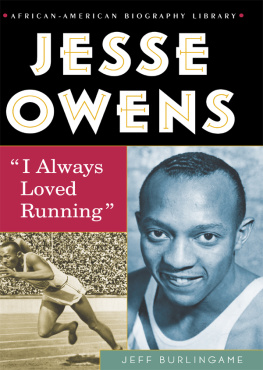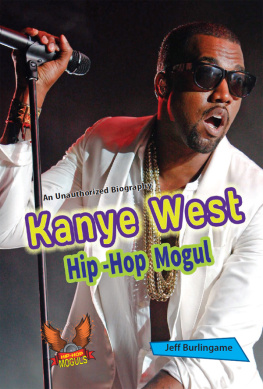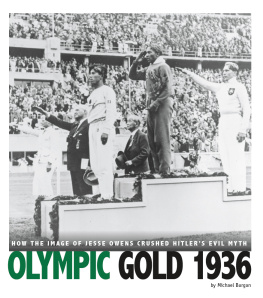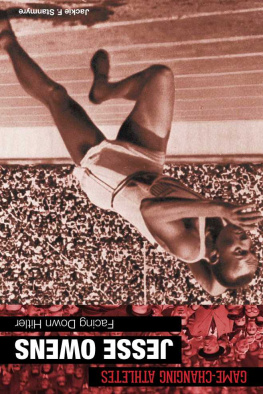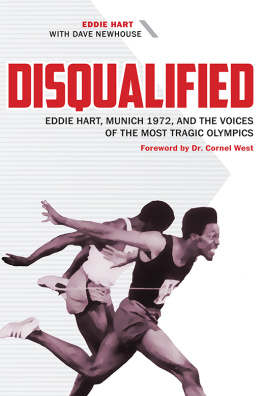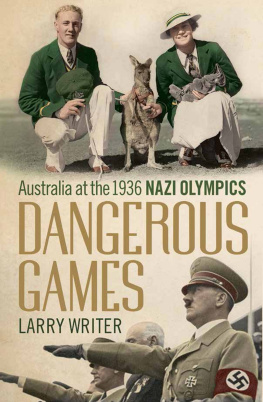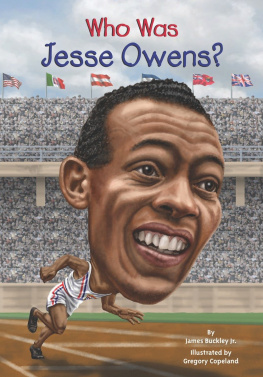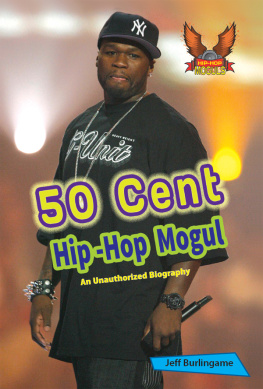SUCCESS IS NOT EASILY ACHIEVED
In 1936, in front of 110,000 spectators at the Olympic Stadium in Germany, Jesse Owens blew away the competition in the 100-meter final to claim the title of Worlds Fastest Man. He won the gold medal in front of Germanys brutal dictator, Adolf Hitler, defying the Nazi leaders racist ideology. Owens won three more gold medals at the Olympics and returned to the United States a hero. Author Jeff Burlingame explores the life of one of the greatest and most influential athletes in American history.
Jesse Owens is an engrossing treatment of one of Americas most famous athletes of the 20th century.
Dr. Russell Adams, Emeritus Professor at Howard University
An interesting and informative telling of the life of Jesse Owens. Engaging in content and format.
Marlene Owens Rankin, Managing Director, The Jesse Owens Foundation
Award Winner
Jesse Owens: I Always Loved Running, by Jeff Burlingame was the winner of a 2012 National Association for the Advancement of Colored People (NAACP) Image Award for Outstanding Literary Work in the Youth/Teens category. The Image Awards celebrates outstanding achievements in television, recording, literature, and motion picture.
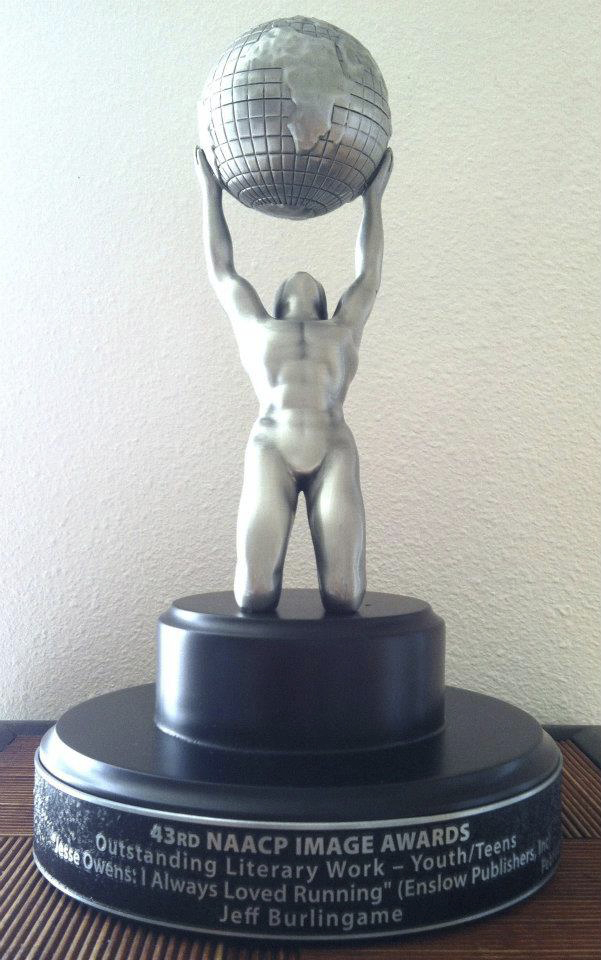
Image Credit: Jeff Burlingame
About the Author
Award-winning author Jeff Burlingame has written several books for Enslow Publishers, Inc., including Jesse James: I Will Never Surrender and Malcolm X: I Believe in the Brotherhood of Man, All Men. His biography on Malcolm X was nominated for the same NAACP Image Award in 2011.


Image Credit: histopics / ullstein bild / The Image Works
Jesse Owens
More than 110,000 people watched from the stands as the runners gathered at the starting line. As each of the six men dug their shoes into the soggy cinder track, the enormous crowd at Olympic Stadium in Berlin, Germany, began to buzz with anticipation. These were the six fastest runners in the world, and it was time for the finals of the Olympic 100-meter dash. As one of the most basic and exciting Olympic events, the 100 meters has always been a crowd favorite. It was the event everyone wanted to see. This year, 1936, American Jesse Owens was the one most people wanted to watch run the race.
The twenty-two-year-old college student from Ohio State University appeared to be unbeatable. He had wowed everyone in his preliminary races. In one the day before, he had tied the world record of 10.3 seconds. The record already was his; he had set it earlier in the year. In the next heat, Owens broke the world record by running 10.2 seconds, only to soon find out the record would not stand because there had been too much wind at his back during the race. At least that is what the German officials ruled, even after American photographers produced pictures that showed the stadiums flags were not blowing at all.
Earlier on this day, August 3, Owens had dominated his semifinal race. This set the stage for a thrilling final that evening. The winner of the 100-meter dash would earn the title of Worlds Fastest Man. As it was in every Olympic event, a gold medal also awaited the winner. Its winner often gained immense popularity and notoriety worldwide. But this race was even more special than any others. It offered a special twist. This was Germanys Olympics, and Germanys ruler, Adolf Hitler, believed blacks were an inferior race. Two black runners had made it to the finals, and Owens was one of them. Needless to say, Hitler did not want Owens to win. He was cheering for his fellow German, Erich Borchmeyer. Hitler believed his German athletes were superior and could not be beaten.
As Owens, Borchmeyer, and the four other runners dug their feet into the tracks soft surface and crouched into their starting positions, the German starter barked his orders:
Auf die Plze! On your marks! Owens took a deep breath, swallowed hard, and focused his eyes toward the finish line.
Fertig! Get set! Owens rose from his crouch, ready to spring forward at the next signal
Bang! At the blast of the starters gun, Owens burst from the starting holes he had dug just moments earlier. His start was perfect. Within ten strides, he had opened up a large lead over the rest of the field. As he cruised down the wet track in the inside lane, his lead grew larger. Near the end of the race, fellow American Ralph Metcalfe somewhat closed the gap. But Metcalfe had faltered a bit at the start and, by that point, Owenss winning was a formality. Owens broke the tape in 10.3 seconds, tying the Olympic record. Hitlers pick, the German Borchmeyer, finished a distant fifth.
A majority of the packed stadium erupted with joy at Owenss accomplishment. They had hoped for their countryman to pull off an upset but knew his chances were slim. Owens was simply too dominating, and the crowd appreciated the greatness it was witnessing. Owens had again tied the Olympic and world records and did not even look very tired at the end of the race. The mostly German crowd began wildly chanting his name:
Owens was simply too dominating, and the crowd appreciated the greatness it was witnessing.

Image Credit: Associated Press
Jesse Owens (at far right crossing the finish line) is shown winning the 100-meter dash at the 1936 Olympics. Owens ran the race in 10.3 seconds, tying the Olympic record.
Yess-say Oh-vens! Yess-say Oh-vens!
Throughout the rest of the Olympics, the crowd kept chanting Owenss name. It was the same reaction he had received since arriving in Berlin. People stood outside his bedroom window at the Olympic Village trying to snap a photo of him. Owens was an international superstar. One newspaper reported, The autograph maniacs grabbed him and twisted him around and people poked the snouts of cameras into his face.
Hitler was appalled by Owenss accomplishment. In a little more than ten seconds, he had seen a black man win the hearts of his followers and defeat one of his superior athletes. It was a low point for the German leader.
On the first day of the Olympics, Hitler had shaken the hands of most of the gold medalists to congratulate them. But, on this day, he would not shake Owenss hand or meet with the champion, even after one official encouraged him to do so. Hitler said, The Americans should have been ashamed of themselves for allowing their medals to be won by Negroes. I would never have shaken this Negros hand. Do you really think Id allow myself to be photographed shaking hands with a Negro?
The day before Owenss win in the 100 meters, Hitler also had not congratulated the winners of the high jump event, which included two African Americans. Some historians argue that timing may have been the reason he did not do sobecause Hitler had left the stadium shortly after his countrys jumpers were eliminated. Others say Hitler had decided after the first day that he would not congratulate any winners in public because it was too time consuming, and that is why he did not congratulate Owens. But to this day, most believe Hitler refused to shake Owenss hand because he was black.

